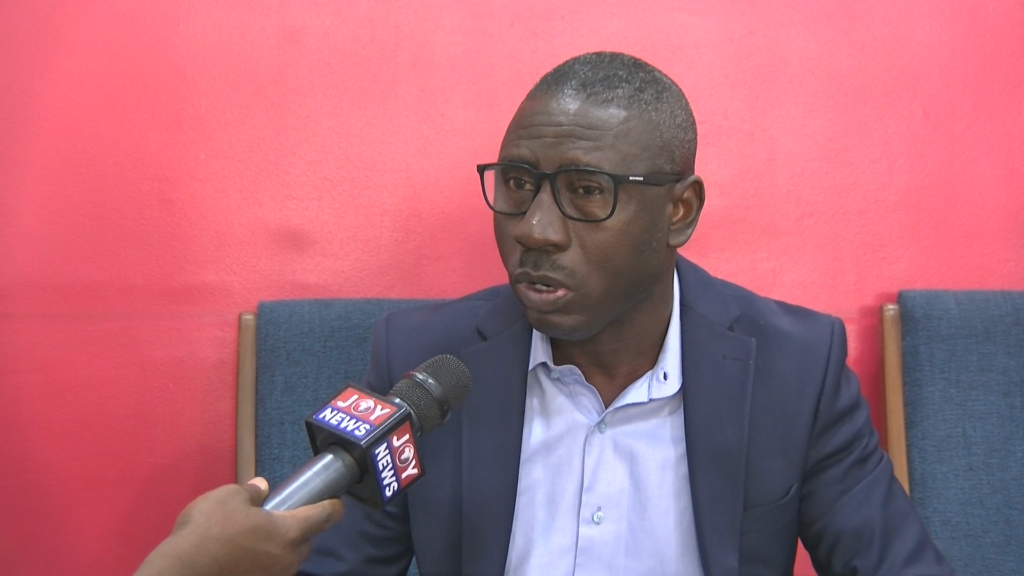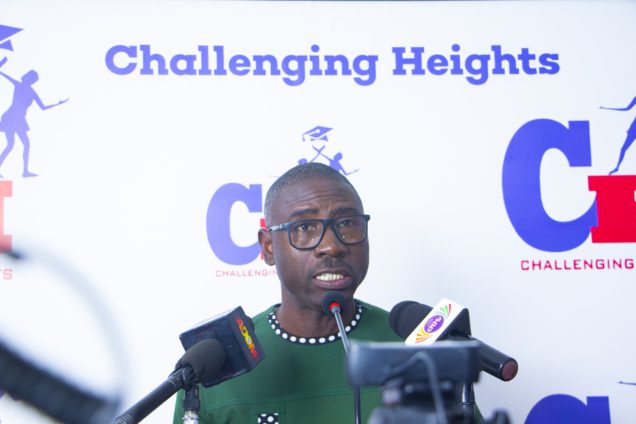Challenging Heights, a non-governmental organisation (NGO), has petitioned the Africa Continental Free Trade Area (AfCFTA) over human trafficking and modern day slavery in the supply chains of AfCFTA participating companies.
This petition was submitted to the AfCFTA Secretary General through the AfCFTA Secretariat, urging the organisation to address human rights issues, especially those bordering on human trafficking, modern slavery, forced labour, and other human rights abuses throughout company supply and value chains.
Challenging Heights says this is to avoid the risks of international product sanctions, as well as to enhance international consumer and investment confidence in the participating companies within the AfCFTA agreement.
The Chief Executive Officer of the organisation, James Kofi Annan, says that currently, there are an estimated 49.6 million people in modern slavery globally, generating over 150 billion US dollars annually.

Modern slavery, he implies, is prevalent in Africa, with over 27.6 million people affected (in Africa alone) on any given day, and more than 3.3 million of those affected being children (ILO, 2022).
Background
The Universal Declaration of Human Rights (UN, 1948) sought to guarantee the rights of all people in the world. Since the declaration was made, the United Nations has established several protocols and funds to address issues of human rights violations globally.
About 12 years ago, the United Nations published the United Nations Guiding Principles on Business and Human Rights (UN, 2011). The Guiding Principles contain three fundamental pillars: protect, respect, and remedy, detailing concrete and actionable steps for governments and companies to meet their obligations to protect human rights in company operations, and to provide remedies if human rights violations do occur.
Globally, a lot of efforts have been made to address the issue of human trafficking and modern slavery. The 2030 Agenda for Sustainable Development, Goal 8.7, sets out to “take immediate and effective measures to eradicate forced labor, end modern slavery, and human trafficking, and secure the prohibition and elimination of the worst forms of child labor, including the recruitment and use of child soldiers, and by 2025 end child labor in all its forms."
Various countries and states have passed various laws and regulations that address human trafficking and modern slavery, from victim protection to addressing supply chain issues related to modern slavery. Forced labor has been made a crime in the United States of America. Forced labor has been defined in the United States Code, Section 1589, as “knowingly providing or obtaining the labor or services of a person using force, threats of force, physical restraint, or fraud." This law mandates the US State Department of Labor, to blacklist products that are tainted with forced labor.
The California Transparency in Supply Chains Act (2012) for instance requires all retailers and manufacturers doing business in California with a profit of $100 million or more to inform the general public about human trafficking and modern slavery risks in their supply chains. This law makes it possible for consumers to learn about companies' efforts to address human trafficking and modern slavery issues in their supply chains and gives consumers the chance to be more responsible in their buying decisions.
The California modern slavery law is similar to that of the UK modern slavery Act (2015), which also makes it mandatory for companies to publish efforts they are making to address modern slavery and human trafficking. The Australian Modern Slavery Act (2018) puts the responsibility on Australian companies, both home and abroad, to address issues within their supply chains or face severe sanctions. Currently, the European Union is discussing new legislation aimed at comprehensively addressing human rights due diligence issues, including human trafficking and modern slavery, in business supply chains.
All these superpower country laws have several implications for businesses and products from Africa, as the requirements of the laws include first-, second-, third-, and, in some cases, fourth-tier due diligence requirements.
Human trafficking and modern slavery
CEO of Challenging Heights, James Kofi Annan, says many members of the African Union, and AfCFTA for that matter, have established human trafficking legislations that address human trafficking from victims’ perspectives. However, there is a wide gap in the human trafficking and modern slavery laws established in African countries. There is, as yet, no law in Africa that makes it mandatory for African businesses to address human trafficking and modern-day slavery issues in their supply chains. Also, he indicates there are no comprehensive arrangements within the business community to identify and address human trafficking and modern-day slavery issues within business value chains.
Obviously, today’s business environment has a complicated supply chain mechanism that goes beyond one country, or one continent. Businesses done in Ghana, Nigeria, or any other part of Africa have their value chains deeply connected to those in Europe, Asia, America, Australia, and so on, due to factors such as raw material sourcing, financing arrangements, investments, equipment requirements, and so on. In effect, due diligence laws passed in America, Europe, Asia, or Australia, inevitably affect businesses in Africa due to the complexities of human resources, supply chains, and the reach of the laws at all levels.
There have been several global private and intergovernmental initiatives aimed at helping the private sector address issues of modern slavery, both in their supply chains, and as part of doing responsible business. The Bali Process is an international governmental initiative which was established over two decades ago, that brought 49 countries of the world together to foster cooperation towards addressing modern slavery through policy and regulatory reforms, and corporate social responsibility. The Khartoum Process, set up ten years ago, is an intergovernmental initiative aimed at addressing the flow of modern slavery from Africa to the Gulf countries. The UN backed New York based Global Financial Sector Commission, which Challenging Heights was deeply involved, produced a report that brought the global financial sector together, and produced a Blueprint, which allows the financial sector to help address human trafficking and modern slavery comprehensively. Their work resulted in the establishment of the Finance Against Slavery and Trafficking Initiative (FAST Initiative), of which Challenging Heights is a founding board member.
James Kofi Annan stated: “Therefore, AfCFTA has an opportunity to leverage existing national and international regulations and initiatives to establish initiatives that will provide participating companies with the obligations to address human trafficking and modern slavery in their supply chains." "As AfCFTA is young, such a concurrent initiative will provide the business cultural environment that will assist participating products with a clean image to enter markets where they would have faced blacklisting or weakened consumer confidence.”
He further noted that investors all over the world are investing in responsible businesses. The Principles of Responsible Investment (PRI) group, with 7,000 member investors and corporate signatories representing businesses in 135 countries, is the world’s largest voluntary corporate sustainability initiative whose members underscores what are the issues engaging investors’ attention in the global business environment – human rights, and the environment.
“Such international initiatives have resulted in international banks being forced to lend to responsible and diligent companies." Consumers are looking into responsible companies that are addressing issues of due diligence before making consumption decisions. "The need for AfCFTA to help members address supply chain issues cannot, therefore, be overemphasized,” he stated.
Challenging Heights is by the petition requesting that AfCFTA establish an initiative that obliges its members to approve corporate policies that address supply chain issues as well as its own internal human rights issues. The organization is also requesting that AfCFTA initiate conversations with the governments of member countries to pass punitive company/product due diligence legislation.
Challenging Heights finally requests AfCFTA set up a unit to monitor compliance and for the unit to work with member countries to facilitate the passing of due diligence legislation.
Challenging Heights, with several years of national and international advocacy experience and years of being involved with most of the said international initiatives, is willing and able to support AfCFTA in these directions.
The NGO, officially established in 2005, works for the protection of human rights, especially the protection of victims of forced labor, human trafficking, and modern slavery. Since its inception, the organization has rescued over 1,800 children from human trafficking and modern slavery, supported over 4,000 women and over 4,000 youth, and been part of several successful advocacy efforts, both in Ghana and abroad.
Latest Stories
-
Trump administration halts scheduling of new student visa appointments
1 minute -
Nana Fredua-Agyeman Jnr. eulogises Nana Kwasi Gyan-Apenteng
6 minutes -
NPP members attack JoyNews reporter during Wontumi’s EOCO detention coverage
18 minutes -
Security tightened at EOCO as tension mounts over Wontumi’s arrest
19 minutes -
AG files motion to strike out suspended CJ’s supplementary affidavit
34 minutes -
Lamine Yamal signs 6-year extension at Barcelona
38 minutes -
NPP supporters attack police pickup trucks at EOCO’s head office
41 minutes -
Wontumi’s arrest by EOCO likely linked to suspected money laundering – Kpebu
1 hour -
A/R: Fire destroys several apartments at Bomso
1 hour -
Scores of NPP supporters storm EOCO office over Wontumi’s arrest
2 hours -
Consumer Protection Agency commends FDA for crackdown on dangerous fake diapers
2 hours -
Two jailed 14 years for defilement in disturbing ‘money charm’ case
2 hours -
AI & Automation – The secret weapons transforming customer experience in Ghana
2 hours -
CJ’s removal saga: This is ‘alien to justice’ – Dame criticises ongoing proceedings
2 hours -
Exhibit your christian values at work to support Ghana’s development – Dean of St. Cyprian Anglican
2 hours

